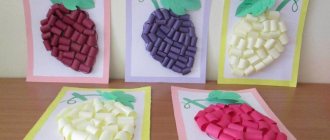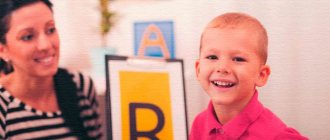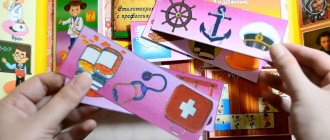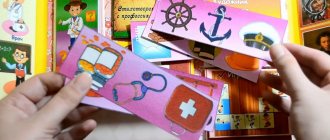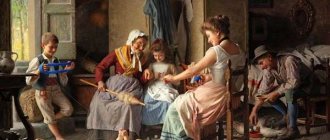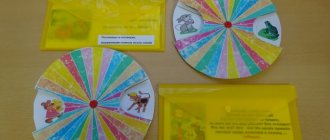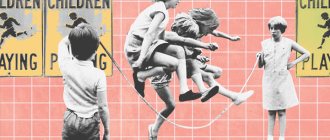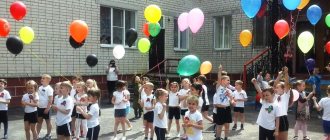General recommendations for conducting speech therapy classes on the topic “Professions” in a preschool educational institution
When conducting a speech therapy session “Professions”, it is important to take into account the characteristics of children’s perception. Children do not yet have self-discipline skills. Therefore, it is important that the activity is playful in nature and captivates them.
Hint for writing a story
Developmental activities for classes
When conducting classes, not only games can be used that expand the children’s knowledge, but also exercises to learn how to correctly pronounce sounds in words and improve speech skills. It is recommended that you plan your children's learning in the coming weeks.
Games on the topic: “Professions”
In this case, riddles and questions are asked, the answers to which expand the children’s knowledge about various specialties. Sometimes false statements are made so that kids will find a mistake.
Stories relating to various specialties are compiled.
List of reading materials for the group
When lexical topics in speech therapy related to professions are considered, for example, reading the following works can be used to work with children:
- J. Rodari “What color are the crafts.”
- Y. Akim “Neumeika”.
- A. Shibarev “Mailbox”.
Note! Reading and discussing works of fiction will help children better understand the topic they are studying. It is useful if such readings are additionally carried out by their parents at home.
Thematic physical education minute
The following describes one example of physical education.
Kids perform movements while the teacher reads the poem “Postman”:
What the postman brought us (Clenches his fists)
He walks around with a thick bag
Translation, magazine, newspaper
There are two cassettes in the parcel (Kids straighten and bend their fingers)
And a letter from Aunt Valya
So that they await her arrival (Hands spread to the sides).
Gymnastic exercises
Typically, physical exercises and finger gymnastics are used during classes. At the same time, the teacher reads a poem related to the topic under consideration. At certain moments, children perform movements that relate to the spoken phrases. If necessary, the teacher tells you what to do.
Using interactive whiteboards and ICT in the learning process
The use of ICT makes it possible to offer children exciting educational computer games.
For example, they may be offered pictures of people and objects that they use in their work. At the same time, children will have to describe in words what is shown in the pictures and write a short story about this profession. The use of computer technology can expand the learning opportunities for preschool children. However, it is necessary to teach children to work with it in subgroup classes.
Age characteristics and correction of speech disorders during group classes
Knowledge of the peculiarities of the lives of adults related to their work is vital for children, but at different ages the approach to studying issues related to professions should be different. He must take into account the age characteristics of the children.
Poster about different professions
Lexical topic “Professions” in the middle group
Classes in the middle group not only develop speech skills, but also provide basic knowledge about what professions are and what they are like.
Purpose and objectives of the lesson: getting acquainted with different professional specialties
The following tasks are performed:
- When working with children, they are given the concept that there are different professions and are told about their main features.
- Vocabulary develops, articulation improves when pronouncing sounds.
- Children develop auditory attention and logical thinking.
It is recommended to plan classes for the near future.
Brief lesson plan
Finger gymnastics is performed with children. It is done as follows:
Games for speech development in the senior group of preschool educational institutions
There are many noble professions (In this case, in turn, each finger of the right hand is connected to the thumb).
Both useful and pleasant (Make the same movements with the fingers of your left hand).
Cook, doctor, painter, teacher, salesman, miner, builder (Connect the fingers of the left hand and right hand with the thumbs).
I don’t name everyone at once (at the same time, the kids clench and unclench their fists several times).
I suggest you continue (children stretch their arms forward, keeping their palms facing up).
Next, the teacher conducts a poetic dialogue with the kids: “Was there a shoemaker?/Was!/Sewed boots?/Sewed!/Who are the boots for?/For the neighbor’s cat!” This exercise is designed to improve the clarity of diction and work on the expressiveness of the pronunciation of sentences.
The lesson uses tongue twisters to develop clarity of pronunciation and correct pronunciation of various sounds. At the same time, the teacher and the children try to pronounce certain phrases. Here is an example of a tongue twister: “The leaking faucet really wants the plumber to fix it.”
Important! Throughout the lesson, children are given a variety of vocabulary exercises.
Thematic poems and tongue twisters
The poetic form of presenting material to children helps them better assimilate the material. Therefore, it is important to use poems and read them aloud to the teacher together with the children. One of the exercise options is to ask poetic riddles.
Here are some examples:
- “Doctor, but not for children, but for birds and animals. He has a special gift. This doctor..." (Vet).
- “We teach children to read and write. Love nature, respect the elderly." (Teacher).
- “At work, day after day, he commands with his hand. That hand raises. A hundred pounds under the clouds." (Crane operator at a construction site).
Tongue twisters not only allow you to improve your vocabulary, but also provide an opportunity to improve children’s diction.
The following tongue twisters can be used:
- “Sailors in sailor suits. Sailor suits in stripes."
- “Two woodcutters, two woodcutters are chopping wood with axes in the yard.”
- “The weaver is weaving fabric for Tanya’s dress.”
When working with children in a speech therapy lesson on the topic “Professions,” the following game can be used. It's called "Fable Poems."
Speech therapist session with children
Its goals are: improving auditory attention, improving the ability to think logically, and developing children’s vocabulary related to the topic of professions.
The game consists of reading poems about the professions of adults to children, and in them the teacher makes erroneous statements. Kids are required to determine what is true and what is not. At the same time, the speech therapist and children discuss the answers in detail.
Lexical topic “Professions” in the senior group
Important! At this age, children are able to master not only basic concepts about various specialties, but also begin to create general ideas about the world of adults and the place that professional activity occupies in it.
Objectives of the lesson: forming a holistic picture of the world
Children are taught to briefly talk about their professions. During the lesson, they learn more about the types of activities adults do. When assignments are completed for children in the speech therapy group on the topic “Professions,” children are taught that work is necessary and its social significance is explained.
Kids are trained to form masculine and feminine words from the names of workers (military and military, teacher and teacher).
Note! Children develop the ability to recognize speech by ear, improve visual perception and attention. They are helped to develop memory, attention and the ability to speak coherently.
Children are encouraged to be active, take initiative, and have the ability to work collectively.
Lesson outline
When considering lexical topics in the senior group, a thematic physical education session first takes place.
A conversation is held about what a profession means for an adult. They talk about how there are different professions and give relevant examples. They talk about the need to earn money to buy household items that the family needs.
Exercises to correct the pronunciation of the sound [р]
The story is told on behalf of the kids who were arguing about whose profession was more important. The teacher and children discuss this dispute and give their answers.
A rhyming game is being played. For example, phrases are uttered about professions related to transport: “The train is driven by ... (driver). Plowing the field... (Tractor driver)..." Children must complete each phrase.
Children take cards out of envelopes and see pictures of a person working. They should talk about his specialty.
Children, with the help of a teacher, compose their stories about various professions, guided by a rough plan and pictures.
A physical education session is held. At the same time, poems about professions are read, during which children imitate the corresponding movements.
The teacher gives phrases, and the children guess who could say them.
Kids are asked to name workers in masculine and feminine genders (for example, pilot).
In conclusion, the results are summed up, the teacher reminds the children what new they have learned.
Children are told about professions
Game technologies in education
In the process of working with children, lexical exercises are actively used and physical education sessions are held. Children are taught to independently compose simple stories about various specialties. Questions and riddles are actively used, to which children must find the answer.
Lexical topic “Professions” in the preparatory group
At this age, it is important to prepare people for school, to give them knowledge of how adults live.
Purpose and objectives of the lesson
In classes with preschoolers, it is necessary not only to expand the vocabulary related to the topic under consideration, but also to form their horizons, make knowledge more systematic, develop children’s communication skills, and the ability to coherently express their thoughts.
Activities
At this time, physical education and game moments are still important, but the formation of an outlook, the ability to express one’s thoughts and the ability to conduct a focused dialogue with other people are of particular importance.
Preliminary work on studying literary material
The teacher tells the children about descriptions of various workers that are available in children's literature.
The children read aloud thematic literary works.
Equipment
When the lexical topic “Professions” is considered in the preparatory group, pictures are needed as handouts. They should depict representatives of various professions.
Note! The teacher should have prepared demonstration images on the topic of the lesson. A board or screen can be used on which visual material will be shown.
LEXICAL TOPIC "PROFESSIONS".
https://www.liveinternet.ru/users/4619293/post215428872/
CHILDREN SHOULD KNOW: The names of different professions. Purpose of different professions.
CHILDREN SHOULD KNOW NOUNS: doctor, builder, teacher, fireman, photographer, cook, hairdresser, policeman, tailor, shoemaker, baker, writer, pilot, driver, librarian, salesman, gardener, carpenter, painter, bricklayer, electrician, crane operator, excavator operator , welder, glazier, craftsman, architect, tractor driver, combine operator, milkmaid, poultry worker, pediatrician, dentist, ophthalmologist, surgeon, neurologist, nurse.
ADJECTIVES: kind, attentive, caring, responsible, professional, skillful, knowledgeable, conscientious, disciplined;
VERBS: treats, teaches, educates, stews, photographs, cooks, cooks, cuts, lays, looks after, sews, mends, cuts, bakes, writes, composes, flies, drives, carries, gives out, receives, sells, counts, cares, grows, lays, installs, lifts, manages, paints, digs, plans, glass, welds, sows, plants, digs.
ONE IS MANY. Teacher - teachers - teachers. Doctor - doctors - doctors. Seller - sellers - sellers. Baker - bakers - bakers. Photographer - photographers - photographers. Tailor - tailors - tailors. Milkmaid - milkmaids - milkmaids. Postman - postmen - postmen.
NAME BY MODEL (children over 6 years old): He is an artist, and she is an artist. He is a teacher, and she is... . He is a writer, and she is... . He is a conductor, and she is... . He is a singer and she is... . He is a translator, and she is... .
WHO'S DOING WHAT ? Teacher - teaches reading, writing, counting. A fireman puts out a fire. Builder - builds and repairs houses. Painter-plasterer - paints, whitewashes, plasters. Photographer - takes photographs. Cook - … . Tailor -…. Hairdresser - … . Librarian -... Doctor - … . Writer - … . Driver - … . Tractor driver -... Milkmaid - ... . Poultry - ... .
WHO NEEDS WHAT FOR WORK? Hairdresser - scissors, comb, hair dryer, curlers. To the doctor - medicine, a white coat, a thermometer. To the artist -... To the teacher -... To the tailor -…. Painter -…. Rybolov - ... . To the seller -…. To the gardener -... Carpenter -... Milkmaid -... To the tractor driver -...
GUESS THE PROFESSION (children over 6 years old). Who carries the luggage? (Porter.) Who welds the pipes? (Welder.) Who inserts the glass? (Glazier.) Who works on the crane? (Crane operator.) Who lays the bricks? (Mason.) Who sharpens knives? (Sharpener.) Who repairs the watch? (Watchmaker.) Who works on the excavator? (Excavator operator.) Who paints the walls? (Painter.) Who takes care of the birds? (Birdwoman). Who composes the music? (Composer.) Who plays the piano? (Pianist.)
CONFUSION. A painter sews clothes. The driver controls the plane. The hairdresser knits a sweater. The librarian delivers mail. The photographer composes music. A tractor driver sews clothes.
DESCRIBE YOUR PROFESSION ACCORDING TO THE PLAN: Name of the profession. What tools are needed to work in this profession. What does a person in this profession do?
NAME (children over 6 years old): Children's doctor - ... (pediatrician). Dentist - ... (dentist). Eye doctor - ... (ophthalmologist). The doctor who performs the operation is ... (surgeon). The doctor who treats nerves is ... (neurologist). Physician assistant - ... (nurse).
Medical clothing - ... (cap, scarf, gown, gloves). Medical instruments - ... (syringe, spatula, pipette, thermometer, hammer, tweezers).
What is a profession? (Business, work, occupation.) Name the professions of your parents. What are professions for? What do you want to be when you grow up? Why do you need to study professions? Where are they taught?
A MINUTE OF REST
We teach children to read and write, to love nature, to respect the elderly. (Teacher.)
We get up very early, because our job is to take everyone to work in the morning. (Driver.)
The glass eye will point, it will click once - and we will remember you. (Photographer.)
We must fight fire, We are partners with water. With us you will not be afraid of carbon monoxide gases. People really need us, so who are we? - … (Firefighters).
Tell me, who cooks cabbage soup so deliciously, Smelly cutlets, salads, vinaigrettes, All breakfasts, lunches? (Cook.)
SAY A WORD.
In the carpenter's bag you will find a hammer and a sharp... (knife). Any tool is available - a plane, and... (a chisel).
We must fight fire. We are brave workers. We are partners with water. People really need us. So who are we? - ... (firemen).
I would definitely want to become a pilot, I would then take a plane to Moscow... (Fly).
A hasty thread runs after the needle. I can do anything for myself... (sew).
It’s not difficult for me to mend a sock myself. Fix the pocket, sew it down... (belt).
There are probably a thousand pounds in it! Heavy... (threshing).
I’m not bragging, I’ll say: I’ll make all my friends younger! They come to me sad - With wrinkles, with folds. They leave very nice - Cheerful and smooth. So I am a reliable friend, Electric... (iron).
In the world of various words, That shine, burn and burn, Golden and steel. Diamond There is no more sacred word... (labor).
The pilot lifts into the blue sky... (plane).
He drove the goats out onto the mound, cheerful... (shepherd boy).
Plane in hand - the work is different: Knots, squiggles with a plane... (planing).
But our painter does not come into the house with a brush and bucket: Instead of a brush, he brought a mechanical... (pump).
So that people don’t get wet in the rain, the roofer covers... (the house) with iron.
A crane is moving - a huge height - delivering iron... (sheets) to the roof.
White sawdust is flying, flying from under the saw: This is the carpenter making frames and... (floors).
If you need to buy us bread or give us a gift, you and I take a bag and go outside. We walk along the shop windows and go into... (shop).
Well, in this store there is a pretzel, rolls on display, and medicinal bread with bran. The store is called... (bread store).
Every day a newspaper is brought to our house by... (postman). Seven brave young mowers were sharpening their scythes and cutting the grass... (mowed).
The roof is being painted in front of the children... (painters).
We're taking the boards up the mountain, we'll build a new one... (house) I'm flying the dolls in the morning. Today I... (nurse).
It's time to paint the rooms. They invited... (painter). Baruzdin S.
The circus performer knows how to prance, animals and birds... (train).
Ir-ir-ir-my dad... (commander).
The future cabin boy brought us some southern fish... (sailor).
She didn’t drink or sleep, she gnawed on a tree... (saw).
The sharp-nosed one sews, stitches and pricks... (needle).
